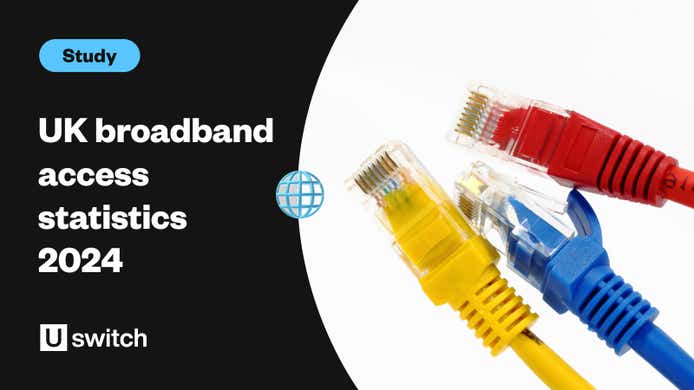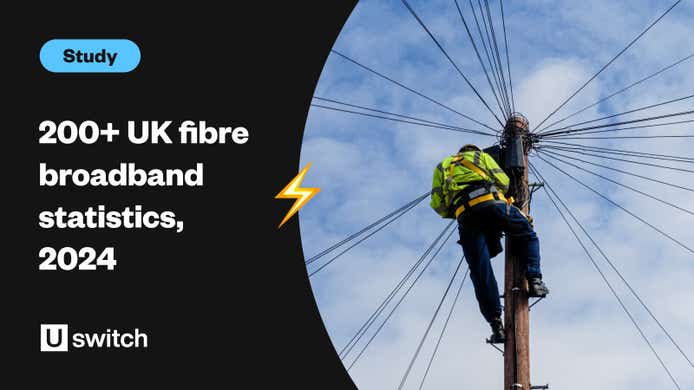In an increasingly digital age, the need for high-speed, reliable broadband is becoming ever more important. No more so than for the 5.6 million private sector businesses up and down the UK.
Business broadband is an essential part of a company’s infrastructure, allowing access to clients, making transactions, and managing important files and data.
But what is the current state of business internet provision in the UK? We’ve collated the latest UK business broadband statistics for 2024, covering business internet usage statistics, the average cost of business broadband and factors that can influence it. Alongside this, we explore the recommended internet speed for small businesses and the impact of slow broadband on companies across the UK.
Top 10 UK business broadband statistics for 2024
- There are around 28.2 million consumer and business fixed broadband connections in the UK.
- BT is the UK’s most used internet provider and has the largest market share (24%).
- UK businesses spent £772 million on ADSL, fibre, and cable fixed broadband services in 2022.
- As of Q3 2023, less than a quarter (23%) of UK businesses lacked gigabit broadband access.
- Only half (52.5%) of UK business leaders felt Project Gigabit has had a notable impact on their company.
- One in five (20%) UK businesses reported having insufficient business internet speeds.
- Around a fifth (19.1%) of UK business owners said upgrading their business broadband increased productivity, with almost a sixth (15.7%) claiming this led to increased profits.
- According to the FCC, the average business requires at least 25 Mbps download and 3 Mbps upload speed to carry out everyday tasks.
- Around seven in 10 (71%) UK business owners feel that slow and unreliable broadband is harming their business.
- Around £1.28 billion was estimated to be lost from the UK economy in 2022, thanks to broadband outages that prevented people from working.
UK business broadband market
As of Q3 2023, there were an estimated 28.2 million consumer and business fixed broadband connections in the UK, with:
- 920,000 DSL connections – a drop of 18% since Q2 2023
- Around 15 million FTTC connections – a decrease of around 3% since Q2 2023
- 5.8 million FTTB/H/P connections – a rise of 13% from Q2 2023.
UK business broadband market share
As of 2024, around a quarter (24%) of people in the UK had internet provided by BT, giving them the largest percentage share of the broadband market. This was followed by Sky, which accounted for around a fifth (21%) of premises.
This means almost half (45%) of the UK population either have BT or Sky as their internet service provider (ISP).
A breakdown of the UK’s most used internet providers in 2023

Virgin Media provided around a sixth (17%) of UK broadband in 2024, meaning that roughly three in five (62%) UK premises now have internet supplied by one of the ‘Big Three’.
Note: Ofcom is unable to provide the share of the UK’s B2B broadband market by provider as they consider the disclosure of this information to be exempt under sections 43 and 44 of the FOI Act.
How much do UK businesses spend on broadband?
According to the most recent broadband statistics from Ofcom, UK businesses spent around £1.07 billion on fixed voice revenue in 2023.
This was coupled with £772 million on ADSL, fibre, and cable broadband services, which are typically used by SMEs.
When broken down, around two-thirds of this (67%) was spent on fibre broadband, equating to approximately £520 million. By contrast, the remaining £252 million was invested into non-fibre broadband services.
How many business broadband connections are there in the UK?
In Q3 2023, the number of wholesale and retail business broadband connections (i.e. FTTH/P/B, FTTC, cable, FWA/satellite, and DSL) stood at 28.7 million – a 0.1% decrease from the previous quarter and 1.1% down from Q2 2022.

During this time, the UK’s fixed broadband retail market shrunk by almost a third (31.7%), resulting in the loss of around 27,600 business broadband subscribers between Q2 and Q3 2023 (87,000 vs 59,400 connections, respectively).
By the end of Q3 2023, it’s estimated that FTTP coverage for UK businesses stood at 17.4 million premises – or just over half (54.5%) of UK companies. This was a 6.7% rise from the previous quarter when around 16.3 million UK businesses had an FTTP internet connection. That said, according to broadband access statistics, just under a quarter (23%) of UK businesses still lacked gigabit access in Q3 2023 – down 2% from three months earlier.
A breakdown of the estimated net loss/gains in broadband connections between UK providers (Q2 2023 vs Q3 2023)

In terms of broadband providers, it’s estimated that BT’s Consumer Division lost 37,000 subscribers between Q2 and Q3 2023. This resulted in a:
- 0.42% fall across the market
- 4% decline in new business orders
- 25% loss in business contract renewals.
However, the number of FTTP connections to UK businesses through BT’s Consumer Unit rose by 335,000 in the same period – an increase of almost a fifth (19.2%) in just one quarter. For context, the number of FTTP connections through OpenReach during this time rose by 364,000 (+10.4%).
As of Q3 2023, OpenReach continued to dominate the UK business broadband market with a total of almost 3.9 million FTTP connections – around three-fifths (60.2%) more than BT’s Consumer Unit by comparison.

At the same time, the other three major internet service providers (ISPs) in the UK (Virgin Media O2, Sky, and Vodafone) all reported net gains in broadband connections between Q2 and Q3 2023, somewhere between 27,000 and 41,000.
By contrast, Talk Talk continued to lose subscribers for the third consecutive quarter, with an estimated net loss of 200,000 connections during the same period.
Conversely, AltNets FTTx consumer broadband base reached an estimated 2.35 million in Q3 2023, up 65,000 (+2.8%) from the previous quarter.
UK business broadband access statistics
Number of UK residential and small business broadband connections
As of Q1 2023, there were approximately 28.1 million residential and small business broadband connections in the UK – a 0.77% increase from the previous quarter. Almost three-quarters (71%) of these came from other types of connections (i.e. not ADSL or cable).
A breakdown of UK residential and small business broadband connections (000s) by year and quarter.

The percentage share of UK residential and small business broadband connections for ADSL has slowly decreased over time.
In Q1 2022, there were almost 3.4 million ADSL broadband connections for residential and small businesses, accounting for around 12% of the overall total for that quarter. By Q1 2023, their numbers had decreased by more than a fifth (21%) to approximately 2.7 million and now constituted just 9.4% of total broadband connections.
The number of other connections (including FTTx) has steadily increased since Q1 2022, from 19.1 million to just over 20 million – an increase of 4.6% in just 12 months.
Project Gigabit and UK business broadband connectivity statistics
In a 2024 survey by Kin + Carta of over 800 business leaders, three-quarters (75%) believe that investment in digital transformation is needed within the next year. A large part of this will be the continued expansion of reliable, high-speed business broadband, capable of speeds of 1 Gbps and above.
According to fibre broadband statistics, as of February 2023, almost three-quarters (73%) of the country was gigabit capable. The government’s target is to reach 85% by the end of 2025, which is a welcomed investment for businesses up and down the UK.

Costing an estimated £5 billion, Project Gigabit aims to get next generation, gigabit broadband to more than one million hard-to-reach homes and businesses across the UK. This is all part of the UK government’s levelling up scheme, to help fund growth in more deprived parts of the country.
An extra £210 million has been made available in vouchers to help those with slow broadband speeds, as well as £110 million to connect up to 7,000 rural GP surgeries, libraries, and schools to faster internet.
The impact of Project Gigabit on business broadband connectivity
A 2023 study by Neos Network looked into the impacts of Project Gigabit, to see how this has affected businesses and the extent to which companies feel this has been positive or negative.
Having surveyed business leaders from 160 UK companies across a range of industries, the aim was to see whether businesses had experienced greater connectivity since Project Gigabit was launched in March 2021 and what more they feel needs to be done.
A breakdown of whether UK businesses feel Project Gigabit has impacted business internet connectivity, speed, and reliability

Despite now covering almost three-quarters of the UK, just over half (52.5%) of business leaders felt that they had seen a notable impact from Project Gigabit.
One in five (20%) UK businesses surveyed reported insufficient business internet speeds, which was having a negative impact on day-to-day operations.
Furthermore, more than half (55.6%) of respondents reported a risk of losing clients because of this.
A breakdown of the impacts of upgrading business internet connectivity

Around one in five (19.1%) UK business owners stated that upgrading their business internet connection had led to increased workforce productivity, with around one in six (15.7%) claiming profits had increased because of better broadband.
Incidentally, just one in 25 businesses (4.5%) claimed that they had seen no benefits since their business internet had improved.
The split between companies situated in rural and urban areas also yielded some interesting results. Most notably, around a fifth (22%) of rural businesses saw increased employee work satisfaction, compared to 15.5% of companies in urban areas.

Increased profitability was generally higher in urban areas (11.2%) compared to businesses located in rural areas (8.5%), with a similar pattern for expanding the customer/client base (10.8% in urban and 8.5% in rural).
Despite the improvements brought about by Project Gigabit, further analysis from Neos Networks found that UK rural areas are still less likely to have access to highly connected, high-speed, reliable internet.
They found:
- For every 10 urban businesses that noted a positive impact from Project Gigabit, the respective figure for rural businesses was just six.
- Connectivity remains poor in UK rural areas, with a quarter of businesses claiming they have insufficient business broadband speeds to conduct smooth, day-to-day operations.
- The corresponding figure for urban areas was 18.2%, meaning rural areas are almost two-fifths (37.4%) more likely to experience an inadequate internet business connection by comparison.
A breakdown of UK business investment intentions towards internet connectivity

Around two-fifths, (42%) of UK businesses surveyed by Neos Networks claimed higher capacity connectivity to the internet was a key area of their growth plan for 2024-26, with around nine in 10 companies saying they’ll invest in improving their internet capacity as part of their growth plans.
Around one in four (25.9%) UK companies based in rural areas want a better internet connection, stating this is integral to their growth plans. The respective figure for urban areas is about half (around one in 10).
Check out Uswitch’s broadband postcode checker to help find the best deals available in your area for a range of broadband packages, including business broadband.
The most important reasons for increasing business broadband connectivity
More than a fifth (22.4%) of businesses surveyed by Neos Networks stated a need to increase computer power to make their service more profitable and/or productive. A similar percentage (21.2%) cited the need to store and utilise ‘Big Data’ to optimise processes and operations.
A breakdown of the most common business reasons for increasing broadband connectivity speed

Around one in 10 (10.8%) have noticed poor connectivity due to a hybrid working model and are seeking a better internet connection to improve the situation.
Incidentally, a similar amount (9.3%) feel that improved connectivity isn’t required for their business to grow.
UK business internet usage statistics
The majority of UK businesses (85%) reported handling some form of digitised data in 2022, making it one of the most common business internet uses by UK companies.
A breakdown of the percentage of UK businesses handling digitised data

Less than two-thirds (63%) of businesses surveyed said they handle digitised personal data, other than that of their employees, with just over half (52%) admitting they dealt with non-personal, digitised data.
A breakdown of data infrastructure used by UK businesses

In terms of data infrastructure, the vast majority of UK businesses (83%) were using standalone devices, such as computer terminals and laptops.
Just under a fifth (19%) were using public cloud providers, with less than one in six (15%) UK companies opting for a private cloud provider.
In addition, the 2022 Business Data Survey also found many businesses were using multiple methods as part of their data infrastructure, such as:
- Almost a quarter (24%) use both standalone devices and cloud providers (either public or private)
- A sixth (16%) used some form of server or outsourced IT provider alongside standalone devices
- Just 7% use a combination of standalone devices, cloud providers, and some form of server.
All of this highlights a growing business demand for a broadband connection that can both support this data infrastructure and facilitate long-term, sustainable economic growth for UK companies.

A study by Shielpay and the Centre for Economics and Business Research (CEBR) found that almost 900,000 UK businesses are now selling via online marketplaces. With an estimated turnover of £282 billion, this equates to just 6% of total UK business turnover for 2022, and a 9.4% rise on respective 2021 figures.
In 2019, less than half (48%) of UK retailers surveyed used marketplaces to sell goods. This figure reportedly rose to more than three-fifths (61%) by 2022.
When questioned as to the main reasons for using online marketplaces to do business:
- More than two-fifths (43%) said it enabled them to extend their customer reach.
- Just over a third (34%) claimed it was easier to sell products by removing technological barriers and operational costs.
- A fifth (20%) admitted the Covid-19 pandemic made it easier to capitalise on the online shopping boom.
- Less than a fifth (19%) said it was mainly to benefit from the marketplace’s name to bolster sales.
Incidentally, more than a quarter (27%) of UK businesses believed there were no drawbacks to using marketplaces and nothing would prevent them from doing so.
Average price of business broadband in the UK
According to Uswitch consumer data, the average cost of business broadband in the UK for 2023-24 is £30 per month (reducing to £27 for those with vouchers and/or bill credit).
As of May 2024, the average price of UK business broadband for Uswitch customers was £40 per month. This is reduced to £29 for those consumers eligible for broadband vouchers and/or bill credit.
The average cost of business broadband in the UK over time
Throughout 2023-24, the average cost of business broadband in the UK fluctuated between £24 a month (November 2023) to £48 a month (April 2024). However, for those with broadband vouchers and/or bill credit, the range in average price was much smaller, from £22 a month (November 2023) to £32 a month (May 2023).
A breakdown of UK average price of business broadband over time (2023-24)
| Month and year | Average cost of business broadband | Average cost of business broadband (inc. vouchers/bill credit) |
|---|---|---|
| May 2023 | £31 | £32 |
| Jun 2023 | £26 | £27 |
| Jul 2023 | £28 | £28 |
| Aug 2023 | £30 | £29 |
| Sep 2023 | £27 | £26 |
| Oct 2023 | £25 | £26 |
| Nov 2023 | £24 | £22 |
| Dec 2023 | £28 | £25 |
| Jan 2024 | £27 | £25 |
| Feb 2024 | £29 | £27 |
| Mar 2024 | £41 | £29 |
| Apr 2024 | £48 | £29 |
| May 2024 | £40 | £29 |
| Grand total | £30 | £27 |
(Source: Uswitch)
When looking at business broadband sales, September 2023 was the most popular month throughout 2023-24, accounting for 12.3% of all sales across this period. This was followed by February 2024, which was responsible for 11.4% of Uswitch broadband sales.
On the other hand, December 2023 and April 2024 were the least popular months for buying business broadband, accounting for 4.2% and 5.9% of sales for the year, respectively.
The average cost of business broadband in the UK by region
There is little variation across the UK on the average cost of business broadband, according to Uswitch’s latest data.
As of 2023-24, those in Northern Ireland typically paid more for their business broadband compared to other parts of the country, at £33 per month. This was contrasted by customers in the South East and East of England, who paid an average of £28 a month.
A breakdown of UK average price of business broadband by region
| Region | Average cost of business broadband | Average cost of business broadband (inc. vouchers/bill credit) |
|---|---|---|
| West Midlands | £30 | £26 |
| Wales | £30 | £27 |
| South West | £29 | £26 |
| South East | £28 | £26 |
| Scotland | £29 | £26 |
| Northern Ireland | £33 | £27 |
| North West | £32 | £28 |
| North East | £31 | £27 |
| Greater London | £31 | £27 |
| East of England | £28 | £26 |
| East Midlands | £30 | £28 |
| East England | £29 | £26 |
| Yorkshire & The Humber | £30 | £28 |
| Grand total | £30 | £27 |
(Source: Uswitch)
For those with broadband vouchers and/or bill credit, the average cost of business broadband ranged between £26 and £28 a month across the UK.
The average cost of business broadband in the UK by average speed
When broken down by average download speed, the cost of business broadband varies considerably. Those on the fastest advertised package (900mb+) can expect to pay around £74 a month for their business broadband – around three-and-a-half times as much as the slowest package (0 - 30mb).
A breakdown of UK average price of business broadband by average download speed

By contrast, those eligible for broadband vouchers and/or bill credit could see their average costs reduce by as much as a third (33.1%) for the fastest package with a download speed of 900mb+, and by more than a quarter (26.7%) for those with an advertised average download speed of 300-900mb.
The average cost of business broadband in the UK by internet provider
When broken down by provider, Vodafone had the lowest average cost of business broadband between 2023-24, at £22 a month. BT Business was the most expensive during this period, costing £59 a month on average – almost three times the amount paid by a typical Vodafone customer.
A breakdown of UK average price of business broadband by provider

For those with broadband vouchers and/or bill credit, the range in average price between providers was much smaller. Those opting for BT Business still paid the most on average (£37 a month). However, this was almost 46% less than standard customers paying an average of £59 a month. Vodafone Business was still the lowest cost on average, at £20 a month.
UK business broadband speed statistics
Ofcom’s most recent SME research found that 94% of UK SMEs said they had an internet connection. So, choosing the right broadband package that offers the most appropriate speed for your business is key. This will help ensure your business needs are met online and prevent you from paying for a service you don’t really need.
A breakdown of different types of broadband and their associated speeds, uses, and technologies
| Type of broadband | Speed | What is this typically used for? | Fixed broadband technologies that can provide this service |
|---|---|---|---|
| Decent | Download 10 Mbit/s; Upload 1 Mbit/s upload | Video calls (i.e. Zoom, Teams). Downloading a one-hour HD TV episode (1GB) in around 15 mins. | Copper (ADSL) FTTC (VDSL) HFC Cable Full Fibre |
| Superfast | Download at least 30 Mbit/s | One person streaming a 4K/UHD video. Downloading a one-hour HD TV episode in under four-and-a-half minutes | FTTC (VDSL) HFC Cable Full Fibre |
| Gigabit | Download 1 Gbit/s and above | Feasibly download full 4K film (100GB) in less than 15 minutes | HFC Cable (when upgraded to DOCSIS3.1) Full Fibre |
(Source: Ofcom)
Full fibre, FTTC, and cable broadband tend to offer faster internet speeds than ADSL services, but they also tend to be more expensive.
The type of broadband you need will depend on what kind of business you are and what you intend to use the internet for. For example, decent broadband (i.e. with a download speed of at least 10 Mbit/s) is probably sufficient for making high-definition video calls through Zoom or Microsoft Teams.
However, for downloading and streaming, you’re probably better off with superfast or gigabit broadband, offering download speeds of at least 30 Mbit/s or 1,000 Mbit/s, respectively.
Test your internet speed with the Uswitch broadband speed test.
Average business broadband speed statistics
The UK average business broadband speed for 2023-24 was 131 Mbps. Between providers, Virgin Media Business registered the highest figure at 442 Mbps. This was around a fifth greater (18.3%) than BT Business in second place.
A breakdown of UK average business broadband download speed by provider

2023-24 at 58 Mbps. This was around seven-and-a-half times slower on average compared to Virgin Media Business.
A breakdown of UK average business broadband download speed by provider

Throughout 2023-24, the UK’s average download speed for business broadband fluctuated from a low of 76 Mbps in October and November 2023 to a peak of 234 Mbps in March 2024.
Recommended internet speed for small businesses in the UK
According to the FCC, the average business requires a download speed of at least 25 Mbps and an upload speed of 3 Mbps to carry out day-to-day tasks, such as emailing, exchanging files, video calls, and using cloud-based software.
However, this may vary depending on a number of factors, such as:
- Type of business you operate
- Size of the files you are downloading and uploading
- The extent to which you’re communicating with customers
- How much you rely on a fast internet connection
- Number of employees using the network at any given time.
A breakdown of recommended internet speeds for small businesses based on the number of users/devices and tasks
| Task | Number of users/devices | Optimum speed |
|---|---|---|
| Online browsing, email, and desk research | 1-2 | 5 Mbps |
| Downloading large files, business communication (i.e. Voice over Internet Protocol (VoIP)), and basic business Wi-Fi use | 3-5 | 25 Mbps |
| Video conferences, streaming, multiple point-of-sale transactions, regular file sharing | 5-10 | 75 Mbps |
| Video conferences, regular cloud computing, and data backups | 10-15 | 150 Mbps |
| Seamless streaming, conferences, and hosting a server | 20-30 | 500 Mbps |
| Extreme speed operations with no interruptions | 30+ | 1,000 Mbps |
(Source: Business.org)
A speed of 5 Mbps should be adequate for small businesses with one or two people using the internet for basic commands (e.g. online browsing, email usage, and research purposes).
However, once the number of employees and devices starts to rise, along with the complexity of the task, the demand for faster broadband also increases. Once your workforce exceeds 10 people, you’ll likely need a business broadband package of at least 150 Mbps – 30 times faster than what is generally required for a one or two-person business.
At the top end of the scale, if your business wishes to have a completely uninterrupted connection and multiple tasks completed at speed, a gigabit business broadband package offering speeds of at least 1,000 Mbps is likely to be the best option.
UK average business internet speed statistics
According to the latest Ofcom research and broadband speed statistics, the average download speed for UK broadband in March 2023 was 69.4 Mbps. This represents a year-on-year rise of almost a fifth (17%) as people continue to upgrade their broadband to higher-bandwidth services, such as full fibre.
The percentage of lines receiving a 24-hour average download speed of at least 30 Mbps stood at 88% in March 2023, a 5% rise from the previous year.

In addition, just 3% of UK lines had an average 24-hour download speed of less than 10 Mbps in March 2023, down from 4% in 2022, with less than 1% reporting an advertised download speed of under 10 Mbps.
The UK average upload speed in March 2023 stood at 18.4 Mbps – a rise of almost three-quarters (73%) from March 2022, when the reported figure was 7.8 Mbps.
An average download speed of 69.4 Mbps would comfortably support a business with 3-5 users/devices doing basic business Wi-Fi tasks, such as downloading large files and business communications. However, should the number of people or devices increase to 5-10 and require internet for video conferencing, streaming, and point-of-sale transactions, this speed may not be sufficient. In this case, an upgrade to a faster broadband package may be required to function smoothly as a business.
Impact of slow internet speed on businesses
A survey by G.Network of over 500 London-based companies found that around seven in 10 (71%) businesses believe slow and unreliable broadband is negatively impacting their business.
The most common issues of poor internet highlighted were centred around:
- Struggling to deliver customer service (34%)
- Accessing documents (33%)
- Making financial transactions (30%).
According to Think Broadband, the average download speed in London is 163.9 Mbps (as of Q1 2024) – 16% faster than the national average of 138.8 Mbps. While many companies may be opting for slower packages (i.e. due to cost) when faster options are available, this will reduce the average speed figures. However, the availability of reliable, ultrafast broadband does appear to still be an issue for some businesses.

In a digital age, UK businesses are demanding better internet connections in order to function. Despite this, almost three-fifths (56%) of employees reported an outage of some kind in 2022, with more than a third (37%) claiming this lasted more than three hours due to power cuts, issues with their provider, damage to cables, or routine maintenance.
Nearly 11 million consumers were affected by internet outages in 2022, with those working remotely facing the majority of disruptions. More than half (51%) of employees now work from home at least once a week, with one in six (16%) agreeing that the outages prevented them from working.
A breakdown of how unreliable broadband has affected workers in the UK
| Response | Percentage of respondents (%) |
|---|---|
| The cost of living crisis means having to work from home to save money | 13% |
| Faced questions or comments from senior management about the quality of their broadband connection | 10% |
| More likely to go into the office as they don’t trust their their home connection | 10% |
| Felt like they have missed out on jobs or promotions due to unreliable broadband | 8% |
(Source: Uswitch via Computer Weekly)
Around one in 10 (10%) workers surveyed felt that this led to questions from their boss about the quality of their broadband, with a similar percentage (8%) feeling as though they had missed out on jobs or promotions due to having an unreliable internet connection at home.
In total, Uswitch research concluded those working from home lost an average of two days’ worth of internet across the year. Based on OECD figures for the UK’s hourly GDP, this equated to an estimated economic loss of around £1.28 billion to the UK economy in 2022 alone, purely by broadband outages that prevented people from working.
Business broadband FAQs
What is business broadband?
Business broadband is a dedicated internet connection that is set up in an office or workspace. It is designed to support a wide range of internet services required by businesses, such as video conferencing, downloading and sharing files, and potentially online transactions.
How much is business broadband?
The average cost of business broadband in the UK is £30 per month, according to Uswitch consumer data from 2023-24. For consumers eligible for broadband vouchers and/or bill credit, the cost decreases to an average of £27 per month.
Consumers will be happy to know that the average cost of business broadband is fairly consistent across the UK, ranging from £28 to £33 per month.
Why is business broadband more expensive?
Business broadband tends to be more expensive than standard home broadband, but this will depend on the package you choose. Some business broadband packages offer additional extras and exclusive features, such as installation of a leased line, 24/7 customer service and fixed IP addresses, which could increase the cost further.
Can I get business broadband at home?
Yes, you can get business broadband at home. However, it’s best to understand your network needs before deciding if business broadband is right for you. For example, if you intend to work long-term from home and have a high dependency on cloud-based applications for work, you may benefit from having a business broadband connection installed in your house.
Can I claim business broadband as a business expense?
Yes, in the eyes of the HMRC, you can claim business broadband as a business expense. However, be aware that this works similarly to other bills like energy, mortgage, or rent, in that you’re only allowed to claim for broadband expenses that relate directly to your work. Therefore, you may need to demonstrate that your internet is used exclusively for the purpose of your work.
What is the difference between home and business broadband?
The main difference between business vs home broadband packages is the level of speed. Business broadband often provides faster speeds that accommodate bandwidth-heavy activities (such as downloading large files) and can support a higher number of users and/or devices simultaneously.
As business broadband is usually set up in a workspace, it often also provides a more reliable connection and a wider range of business-related activities (i.e. video conferencing) compared to standard home broadband.
Business broadband glossary
Altnets
An alternative network provider offering fibre broadband packages. Despite being smaller in scale, these companies offer an independent, telecommunications network that doesn’t rely on the Openreach network, thus providing an alternative source of internet from the UK’s main internet service providers (ISPs).
DSL
Digital subscriber line (DSL) is a method of communication that receives data via copper, and telephone lines, particularly for high-speed networks and internet access.
FTTC
Fibre to the Cabinet (FTTC) is a type of broadband connection that delivers internet access by running fibre optic copper cables via a local street-level cabinet to your home.
FTTP
Fibre to the premises (FTTP) is a type of broadband connection that delivers internet access directly to your home or premises via fibre optic cables.
FWA
Fixed wireless access (FWA) is a type of 5G or 4G LTE wireless broadband technology that allows fixed broadband access with radio frequencies rather than traditional cables.
Gigabit broadband
The next generation of high-speed broadband is capable of delivering speeds of at least 1,000 Mbps (or 1 Gbps).
VoIP
Voice over Internet Protocol (VoIP) is a technology that allows you to make voice calls using a broadband connection as opposed to a regular phone line.
Methodology and sources
https://www.gov.uk/government/statistics/business-population-estimates-2023
https://www.point-topic.com/post/uk-broadband-market-q3-2023
https://www.statista.com/statistics/387678/uk-market-share-of-internet-service-providers/
https://www.ofcom.org.uk/__data/assets/pdf_file/0024/265029/Q1-2023-Telecoms-Data-Update.pdf
https://www.kinandcarta.com/en/leadership-priorities-in-tech/
https://www.gov.uk/government/news/government-launches-new-5bn-project-gigabit
https://neosnetworks.com/resources/blog/uk-business-gigabit-connectivity-report/
https://www.ofcom.org.uk/advice-for-businesses/inexperienced-digital-users
https://www.business.org/services/internet/business-internet-speed/
https://www.ofcom.org.uk/news-centre/2023/latest-home-broadband-performance-trends-revealed
https://www.thinkbroadband.com/news/9761-slow-broadband-and-impact-on-business
https://labs.thinkbroadband.com/local/london






